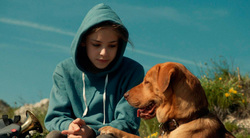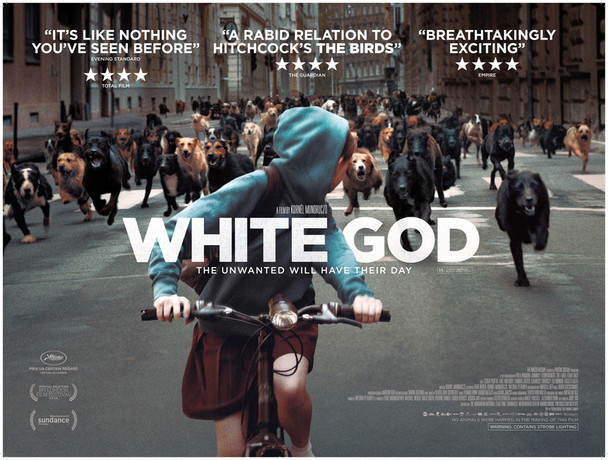
CAST & CREW
Directed by Kornel Mundruczo
Featuring Zsofia Psotta, Sandor Zsoter & Lili Manori
In Hungarian with English Subtitles
Not Rated 121 Mins.
Directed by Kornel Mundruczo
Featuring Zsofia Psotta, Sandor Zsoter & Lili Manori
In Hungarian with English Subtitles
Not Rated 121 Mins.
Reviewed by Guy Lodge - Variety - The Village Voice
The words “release the hounds” take on vibrant new meaning in “White God,” a thrillingly strange update of the “Lassie Come Home” formula in which one lost mutt’s incredible journey to sanctuary evolves into a full-scale man-vs.-beast revolution. The sixth and best feature to date from distinctive Hungarian stylist Kornel Mundruczo, “White God” initially looks to be a sizable departure from his previous work, with its appealingly naive adventure narrative, until the story’s mythic proportions, not to mention its visceral violence, reveal themselves. Arguably shortchanged with an Un Certain Regard slot at Cannes, this moving, technically masterful film reps a marketing challenge to distributors, but should continue to accrue word of mouth from astonished festival auds worldwide.
Otherwise given no explanation in the film, the title “White God” may be a tip of the hat to Samuel Fuller, whose 1982 race-relations allegory “White Dog” takes a similarly conflicted view of the relationship between man and his supposed best friend. Every human character in Mundruczo’s film stands as either a threat or an obstacle to our canine antihero, Hagen — a sturdy, nut-brown crossbreed with a notably perky tail — with the pure-hearted exception of his 13-year-old mistress, Lili (terrific newcomer Zsofia Psotta). The film’s arresting pre-credits sequence finds Lili cycling through the deserted streets of Budapest, a bounding army of street dogs in her wake — she resembles an alternative Pied Piper of Hamelin, complete with trumpet tucked in her knapsack. Seemingly a dream excerpt, the scene takes on very different implications when contextualized later in the film: The future order of things may hinge on whether the hounds are following or pursuing her.
As a parable for the indignities visited upon animals by their human superiors, the film states its intentions upfront: The first post-credits image is of a massive bovine carcass being unceremoniously stripped and gutted in an abattoir, entrails tumbling to the floor like damp laundry. Supervising the procedure is Lili’s father, Daniel (Sandor Zsoter), a mousy, middle-aged divorcee thrown for a loop when his ex dumps his daughter, accompanied by the devoted Hagen, on his doorstep for the summer. His deadbeat-dad apartment is ill equipped to accommodate the dog, whose presence prompts a busybody neighbor to call the authorities. It turns out that the state has imposed a drastic tax on impure breeds; unwilling to pay up, Daniel abandons Hagen on the side of a motorway, to Lili’s understandable distress.
Not merely a story of interspecies hierarchy, then, “White God” also puts forward a simple but elegant metaphor for racial and class oppression, as the outcast (or even outcaste) masses, sidelined in favor of the elite few, band together to assert their collective strength. Seamlessly shifting to Hagen’s perspective (complete with dynamic dog’s-eye-view camerawork from d.p. Marcell Rev), the film sees the dog allying himself with the numerous other discarded mongrels now roaming the streets, feeding on scraps and dodging the municipal pound workers charged with rounding up the strays. Through a chain of escape attempts, Hagen is eventually caught by a Turkish restaurant owner who attempts to train him as a fight dog — encouraging his attack instincts with a brutal training regimen that reps the most grueling watch for dog lovers since “Amores perros.”
Such abuse is turned, with bitter irony, against the perpetrators as a series of contrivances enables the city’s impounded pups to join forces, sticking it to the man in what can only be described as a Pooch Putsch. Hagen’s gradual progress toward mutiny unfolds in parallel with the more typical teen rebellion of Lili, who acts out rashly in response to unfair treatment from her elders, but finds fewer allies in her dissent. Her lone-wolf status is not accidental. As the dogs’ coup gathers force — across a series of tense, stunningly staged setpieces that recall the uncanny horror of Hitchcock’s “The Birds,” ramped up by Asher Goldschmidt’s splendid orchestral score — the young brass player may be the only one who can soothe the savage beast(s).
The unexpected descent into Grand Guignol recalls that of Mundruczo’s last film, the humanized Mary Shelley riff “Tender Son: The Frankenstein Project,” which also examined the insurgence of the supposedly untouchable. This exaggerated development may throw viewers misled by the film’s introductory realism. It’s a risky shift toward the poetically aberrant that would not work if Mundruczo’s storytelling weren’t so rousing and emotionally purposeful — not to mention morally challenging, as man and dog are accorded equally flawed, vengeful psychologies in the film’s universe.
Uniformly outstanding technical credits do full justice to this complex premise, with supple, elastic lensing and editing invaluable in realizing one story world shown from two alternating vantage points. Special mention, meanwhile, must be made of the extraordinary contribution of head animal trainer Teresa Ann Miller, who has extracted a range of individual personalities and character responses from the film’s formidably choreographed canine ensemble. Cast credits include a deserved mention for Hagen performers Luke and Body, but many dogs have their day here.
The words “release the hounds” take on vibrant new meaning in “White God,” a thrillingly strange update of the “Lassie Come Home” formula in which one lost mutt’s incredible journey to sanctuary evolves into a full-scale man-vs.-beast revolution. The sixth and best feature to date from distinctive Hungarian stylist Kornel Mundruczo, “White God” initially looks to be a sizable departure from his previous work, with its appealingly naive adventure narrative, until the story’s mythic proportions, not to mention its visceral violence, reveal themselves. Arguably shortchanged with an Un Certain Regard slot at Cannes, this moving, technically masterful film reps a marketing challenge to distributors, but should continue to accrue word of mouth from astonished festival auds worldwide.
Otherwise given no explanation in the film, the title “White God” may be a tip of the hat to Samuel Fuller, whose 1982 race-relations allegory “White Dog” takes a similarly conflicted view of the relationship between man and his supposed best friend. Every human character in Mundruczo’s film stands as either a threat or an obstacle to our canine antihero, Hagen — a sturdy, nut-brown crossbreed with a notably perky tail — with the pure-hearted exception of his 13-year-old mistress, Lili (terrific newcomer Zsofia Psotta). The film’s arresting pre-credits sequence finds Lili cycling through the deserted streets of Budapest, a bounding army of street dogs in her wake — she resembles an alternative Pied Piper of Hamelin, complete with trumpet tucked in her knapsack. Seemingly a dream excerpt, the scene takes on very different implications when contextualized later in the film: The future order of things may hinge on whether the hounds are following or pursuing her.
As a parable for the indignities visited upon animals by their human superiors, the film states its intentions upfront: The first post-credits image is of a massive bovine carcass being unceremoniously stripped and gutted in an abattoir, entrails tumbling to the floor like damp laundry. Supervising the procedure is Lili’s father, Daniel (Sandor Zsoter), a mousy, middle-aged divorcee thrown for a loop when his ex dumps his daughter, accompanied by the devoted Hagen, on his doorstep for the summer. His deadbeat-dad apartment is ill equipped to accommodate the dog, whose presence prompts a busybody neighbor to call the authorities. It turns out that the state has imposed a drastic tax on impure breeds; unwilling to pay up, Daniel abandons Hagen on the side of a motorway, to Lili’s understandable distress.
Not merely a story of interspecies hierarchy, then, “White God” also puts forward a simple but elegant metaphor for racial and class oppression, as the outcast (or even outcaste) masses, sidelined in favor of the elite few, band together to assert their collective strength. Seamlessly shifting to Hagen’s perspective (complete with dynamic dog’s-eye-view camerawork from d.p. Marcell Rev), the film sees the dog allying himself with the numerous other discarded mongrels now roaming the streets, feeding on scraps and dodging the municipal pound workers charged with rounding up the strays. Through a chain of escape attempts, Hagen is eventually caught by a Turkish restaurant owner who attempts to train him as a fight dog — encouraging his attack instincts with a brutal training regimen that reps the most grueling watch for dog lovers since “Amores perros.”
Such abuse is turned, with bitter irony, against the perpetrators as a series of contrivances enables the city’s impounded pups to join forces, sticking it to the man in what can only be described as a Pooch Putsch. Hagen’s gradual progress toward mutiny unfolds in parallel with the more typical teen rebellion of Lili, who acts out rashly in response to unfair treatment from her elders, but finds fewer allies in her dissent. Her lone-wolf status is not accidental. As the dogs’ coup gathers force — across a series of tense, stunningly staged setpieces that recall the uncanny horror of Hitchcock’s “The Birds,” ramped up by Asher Goldschmidt’s splendid orchestral score — the young brass player may be the only one who can soothe the savage beast(s).
The unexpected descent into Grand Guignol recalls that of Mundruczo’s last film, the humanized Mary Shelley riff “Tender Son: The Frankenstein Project,” which also examined the insurgence of the supposedly untouchable. This exaggerated development may throw viewers misled by the film’s introductory realism. It’s a risky shift toward the poetically aberrant that would not work if Mundruczo’s storytelling weren’t so rousing and emotionally purposeful — not to mention morally challenging, as man and dog are accorded equally flawed, vengeful psychologies in the film’s universe.
Uniformly outstanding technical credits do full justice to this complex premise, with supple, elastic lensing and editing invaluable in realizing one story world shown from two alternating vantage points. Special mention, meanwhile, must be made of the extraordinary contribution of head animal trainer Teresa Ann Miller, who has extracted a range of individual personalities and character responses from the film’s formidably choreographed canine ensemble. Cast credits include a deserved mention for Hagen performers Luke and Body, but many dogs have their day here.






